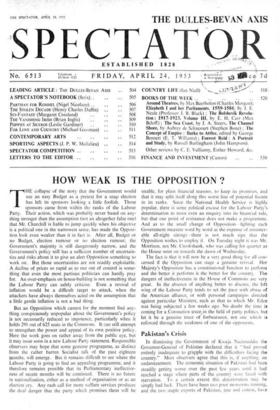HOW WEAK IS THE OPPOSITION ?
HE collapse of the story that the Government would use an easy Budget as a pretext for a snap election has left its sponsors looking a little foolish. Those sponsors came from within the ranks of the Labour Party. Their action, which was probably never based on any- thing stronger than the assumption (not an altogether false one) that Mr. Churchill is liable to jump quickly when his objective is a political one in the narrowest sense, has made the Opposi- tion look even weaker than it in fact is. After all, Budget or no Budget, election rumour or no election rumour, the Government's majority is still dangerously narrow, and the Government's policy still has a sufficient number of uncertain- ties and risks about it to give an alert Opposition something to work on. But those uncertainties are not readily exploitable. A decline of prices so rapid as to run out of control is some- thing that even the most partisan politician can hardly pray for. An over-emphasis on house-building is not something that the Labour Party can safely criticise. Even a revival of inflation would be a difficult target to attack, when the attackers have always themselves acted on the assumption that a little gentle inflation is not a bad thing.
But an Opposition which cannot for the moment find any- thing conspicuously unpopular about the Government's policy is not necessarily reduced to impotence, particularly when it holds 291 out of 625 seats in the Commons. It can still attempt to strengthen the power and appeal of its own positive policy. Here the work goes on rather away from the public eye, but it may issue soon in a new Labour Party statement. Responsible observers may hope that some genuine programme, as distinct from the rather barren Socialist talk of the past eighteen months, will emerge. But it remains difficult to see where the Labour Party is going to find an appealing programme, and it therefore remains possible that its Parliamentary ineffective- ness of recent months will be-continued. There is no future in nationalisation, either as a method of organisation or as an election cry. Any rash call for more welfare services produces the dual danger that the party which promises them will be unable, for plain financial reasons, to keep its promises, and that it may split itself along this worst line of potential fissure in its ranks. Since the National Health Service is highly popular, there is some political excuse for the Labour Party's determination to resist even an enquiry into its financial side, but that one point of resistance does not make a programme. And as to the small change of Opposition—fighting each Government measure word by word at the expense of innumer- able all-night sittings—there is not much sign that the Opposition wishes to employ it. On Tuesday night it was Mr. Morrison, not Mr. Crookshank, who was calling for quarter as the House went on towards the dawn of Wednesday.
The fact is that it will now be a very good thing for all con- cerned if the Opposition can stage a genuine revival. Her Majesty's Opposition has a constitutional function to perform and the better it performs it the better for the country. The dangers of ineffectiveness in the House of Commons arc very great. In the absence of anything better to discuss, the left wing of the Labour Party tends to set the pace with abuse of the American alliance, or with personal campaigns directed against particular Ministers, such as that to which Mr. Eden was being subjected a few weeks ago. No doubt the time is coming for a Coronation trucetin the field of party politics, but let it be a genuine truce of forbearance, not one which is enforced through the weakness of one of the opponents.


































